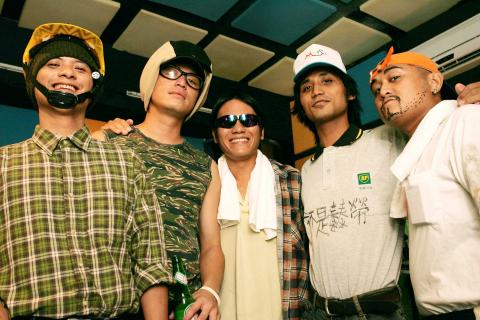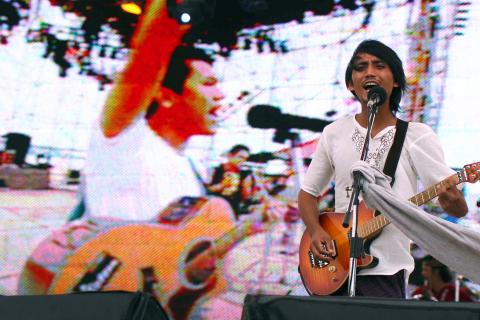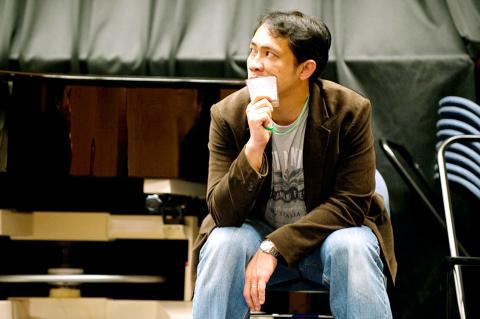“You’re just selfish. Get out!” the drummer of Aboriginal indie-rock band Totem (圖騰) screams at one of the group’s singers. The guitarist steps in to prevent the two from fighting. Audiences could be forgiven for thinking the band was going the way of the Sex Pistols, but Amis director Lungnan Isak Fangas (龍男‧以撒克‧凡亞思) staged the quarrel to “tease out the real emotions” in his latest “documentary,” which follows the group as it tries to make it big.
Fangas started the project after meeting Totem while filming 2004’s Ocean Fever (海洋熱), a documentary about Ho-Hai-Yan Rock Festival’s (國際海洋音樂祭) battle of the bands competition.
“Over the years I have seen Totem growing apart and its members complaining about each other, so I thought it was better to touch on a universal theme rather than just about the band,” the director said. “In talking-head documentaries, people exert constraints and exercise caution in front of the lens, whereas I want to reveal truth through drama ... I exaggerate those conflicting emotions and ask the documentary’s subjects to internalize them through each gesture they make and each word they say in what is mostly improvised performance.”

Photo: Courtesy of Good Day Films
The film interweaves scenes of the staged conflict, which is set in 2009, and the footage Fangas shot between Totem’s inception in 2003 and 2005, when the band won the contest at Ho-Hai-Yan.
As the off-screen narrator, lead singer Suming’s (舒米恩) viewpoint shapes the rock outfit’s past and present, gradually pulling audiences into the struggles of the aspiring musicians who quit their jobs to prepare for the contest.
Tension mounts among the band members and explosive confrontations follow, with drummer A-sheng (阿勝) accusing Suming of “double-crossing” the band because of his participation in Echo GS (艾可菊斯), a side project the Amis singer and songwriter formed with Rukai musician Gelresai (陳世川).

Photo: Courtesy of Good Day Films
Director Fangas’ effort to blur the line between documentary and fiction leaves room for narrative development, as the two segments appear tacked together, rather than forming an integral whole.
Lacking funding, the film was a labor of love for Fangas, who formed close bonds with the musicians.
The result is a strong sense of intimacy and trust, even during the film’s tenser moments, one of which involves a very natural “performance” by A-sheng, who tells Suming he has to quit the band to support his family, despite the fact that audience members know he plays drums with the band Matzka (瑪斯卡樂團), which is recently enjoying growing popularity.

Photo: Courtesy of Good Day Films
Fangas said he has been working on a feature-film project that will morph into an Amis musical, though Aboriginal culture is not his only area of interest.
“I keep my Han Chinese name Lungnan because that is how I am: a mix of Han Chinese culture and Amis inheritances,” the director says.
Fangas has also found inspiration in his position as presidential hopeful Su Tseng-chang’s (蘇貞昌) son-in-law. Still in production, this documentary follows the life of Fangas’ wife, a woman torn between her family and helping her father attain political office.
“It is a universal theme that all women can relate to,” the director says. “But, of course, it is also an elaborate piece of propaganda to make Su look good.”
Who is Singing There is currently on a free screening tour across the country. Its next stop is Kafka on the Shore Cafe (海邊的卡夫卡) tomorrow at 7pm in Taipei. Totem members Zamake (胡祝凱) and A-shin (阿新) will perform after the screening and along with the director will hold a question-and-answer session. For more information about the film, visit singingthere.pixnet.net/blog.

Taiwan has next to no political engagement in Myanmar, either with the ruling military junta nor the dozens of armed groups who’ve in the last five years taken over around two-thirds of the nation’s territory in a sprawling, patchwork civil war. But early last month, the leader of one relatively minor Burmese revolutionary faction, General Nerdah Bomya, who is also an alleged war criminal, made a low key visit to Taipei, where he met with a member of President William Lai’s (賴清德) staff, a retired Taiwanese military official and several academics. “I feel like Taiwan is a good example of

March 2 to March 8 Gunfire rang out along the shore of the frontline island of Lieyu (烈嶼) on a foggy afternoon on March 7, 1987. By the time it was over, about 20 unarmed Vietnamese refugees — men, women, elderly and children — were dead. They were hastily buried, followed by decades of silence. Months later, opposition politicians and journalists tried to uncover what had happened, but conflicting accounts only deepened the confusion. One version suggested that government troops had mistakenly killed their own operatives attempting to return home from Vietnam. The military maintained that the

Before the last section of the round-the-island railway was electrified, one old blue train still chugged back and forth between Pingtung County’s Fangliao (枋寮) and Taitung (台東) stations once a day. It was so slow, was so hot (it had no air conditioning) and covered such a short distance, that the low fare still failed to attract many riders. This relic of the past was finally retired when the South Link Line was fully electrified on Dec. 23, 2020. A wave of nostalgia surrounded the termination of the Ordinary Train service, as these train carriages had been in use for decades

Lori Sepich smoked for years and sometimes skipped taking her blood pressure medicine. But she never thought she’d have a heart attack. The possibility “just wasn’t registering with me,” said the 64-year-old from Memphis, Tennessee, who suffered two of them 13 years apart. She’s far from alone. More than 60 million women in the US live with cardiovascular disease, which includes heart disease as well as stroke, heart failure and atrial fibrillation. And despite the myth that heart attacks mostly strike men, women are vulnerable too. Overall in the US, 1 in 5 women dies of cardiovascular disease each year, 37,000 of them